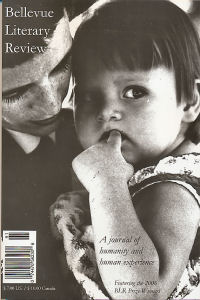BELLEVUE LITERARY REVIEW: Living with Pain

The dirty little secret about literary journals is that they're all pretty much the same. The editors pledge to "find the best writing we can," and the result is a pleasant volume of short stories and poetry, some of which turns you on. The newest literary publication in the MagSampler.com newsstand is a little bit different. It's the Bellevue Literary Review, from New York's famous Bellevue Hospital, and its stories, essays and poetry usually deal in some fashion with mental or physical trauma or disease.
We've received the Spring 2006 issue of the Bellevue Literary Review, which carries the tagline, "a journal of humanity and human experience." This is not E.R. or General Hospital brought to print; in fact, there's hardly a scene set in a hospital within its 160 pages. It contains stories of people living with pain of various kinds, accommodating their lives to its presence with varying degrees of success. Sort of like real life.
This issue features the winners of the 2006 Bellevue Literary Review Prizes. The blue ribbon short story, by accomplished poet but first-time fiction writer Joan Malerba-Foran, is about a white woman from a suburban background who teaches in an urban high school. An alcoholic, she's inured herself to the pain of having to get through the school day without a drink, in her way as stoic as the students who regularly miss school because they're in trouble with the police or have to attend the funeral of a friend shot in a street robbery. The author captures the survival tricks of the alcoholic well: "Even an empty liquor bottle is usable; swish a quarter of a cup of warm water around in it for a minute and in a pinch―like on Sunday―the residue will hold off the shakes."
The story "Mitenka," by recent Russian émigré to the United States Mikhail Sadovsky, takes the reader to a present-day Russian orphanage, now full of Barbie dolls and color televisions provided by well-heeled foreign couples who regularly visit to select their new children. The angelic five-year-old boy whose name gives the story its title, taken away at birth from his alcoholic mother, is perfectly behaved, but occasionally goes off into a trance-like state of reverie. The day comes when a rich foreign couple is about to choose him, but the wife catches Mitenka in a trance and turns away in horror. The next day Mitenka finds that one of his friends is no longer at the communal dinner table.
"The Crush," by Adam Tamashasky, is about a teenage girl who's been in a wheelchair for several years after an automobile accident. Her relationship with long-time best friend Jimmy, a neighborhood boy, is escalating to heavy petting and beyond. But at the moment of truth, confronting her damaged naked body, he can't go through with it, and their relationship ends. She feels stronger for the experience, and "she thought of weakness, and how easily Jimmy could be broken. How easily it seemed anyone might break when they realized they were powerless."
I liked a short poem by Helen Klein Ross. It has a real downer of a title, "To a Child Contemplating Suicide," but it conveys great strength:
Your grandfather outlined
Ghosts of awl, hammer,
Wrench on a pegboard
In permanent ink―
So certain was he that
What was essential to him
Could not be improved upon,
Lost or replaced. Would that
I could make vivid
The void
You'd make upon leaving
The place you belong.
Bellevue Literary Review is published by the Department of Medicine at the New York University School of Medicine. An annual subscription (two issues) is $12 from the publisher; we'll send you a sample copy for $2.59.


0 Comments:
Post a Comment
<< Home